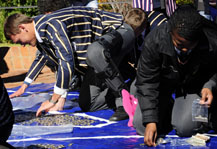Staff, students, learners and the public opened their hearts during R5 coin-laying ceremony
 |
|
Photo: Sonia Small
18 July 2012
|
Amidst a festive atmosphere on the Red Square in front of the Main Building on the Bloemfontein Campus of the University of the Free State (UFS), students, staff, learners and members of the public came together to make their contribution to stop hunger.
In celebration of former president Nelson Mandela’s birthday, the university collected money and food in the form of a coin-laying ceremony, the packing of food parcels, and a message delivered by Emeritus Archbishop Desmond Tutu in aid of the university’s No Student Hungry (NSH) campaign and Bloemfontein Child Welfare.
Representatives from schools in Bloemfontein donated their R5 coins, together with university staff, students, members of the public, and employees of Pick n Pay Hyper. Money collected at the coin-laying ceremony will be shared between NSH and Bloemfontein Child Welfare.
According to Ms Grace Jansen and Ms Carin Buys, patrons of NSH, the more than R42 000 that was collected will be donated to Bloemfontein Child Welfare in an effort by NSH to give back to the community. “We are impressed by the number of people who showed up and by the fact that people opened their hearts and pockets to give,” said Ms Buys.
Thirty employees of Pick n Pay Hyper in Bloemfontein were also present and packed 1 833 food parcels (equivalent to 11 000 meals). This forms part of a Pick n Pay initiative in cooperation with Stop Hunger Now that is being held countrywide today.
In total, 88 000 meals will be distributed in six cities in South Africa today. The 11 000 meals in the Free State have been donated to the university and according to Ms Jansen a social worker at the UFS will distribute it to other needy students. These are students who do not receive bursaries from NSH at the moment. Every food parcel contains rice, dried vegetables, soya, and vitamin and mineral enriched powder.
The university was honoured to have Emeritus Archbishop Desmond Tutu as the speaker at the event. He attended a dialogue in the Series of Dialogue between Science and Society today at the university where he took part in a conversation with Profs. Mark Solms and Pumla Gobodo-Madikizela as part of the Global Leadership Summit.
He made a special appearance at the university’s Nelson Mandela Day festivities. His message was simple but inspiring: “Everyone has, just like Madiba, the capacity to change lives. I hope there are people present who can say that they want to improve someone else’s life. You have the chance to make South Africa a country where no one goes to bed hungry. Help us to make South Africa a country where we have compassion for each other and care for each other”.
The UFS would like to thank the following schools for their contributions:
Grey Kollege Primêre Skool
Grey Kollege
St Michael's School for Girls
Hoërskool Jim Fouché
Hoërskool Fichardtpark
Hoërskool Sentraal
Navalsig High School
HTS Louis Botha
Eunice High School